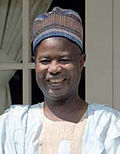| |||||||||||||||||
| |||||||||||||||||
| |||||||||||||||||
 |
|---|
Presidential elections were held in Cameroon on 5 April 1980. The country was a one-party state at the time, with the Cameroonian National Union as the sole legal party. Its leader, Ahmadou Ahidjo, was the only candidate in the election, and won unopposed. [1] Voter turnout was 99%. [2]
